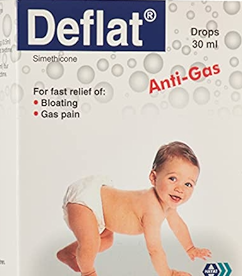
DEFLAT 40mg/ml Price
Active Substance: Simethicone.
Overview
Welcome to Dwaey, specifically on DEFLAT 40mg/ml page.
This medicine contains an important and useful components, as it consists of
Simethiconeis available in the market in concentration
Name
Simethicone
Precaution
More than 12 doses per day should not be used, except under the advice and supervision of a physician. Keep the medicine out of the reach of children.
Indication
Peptic ulcer, Infantile colic, Upper GI bloating, Functional dyspepsia, Spastic or irritable colon
Contra indication
There is no information about the contraindication of Simethicone.
Side Effect
Simethicone is physiologically inert and no adverse effect has been reported after oral ingestion. Loose stools.
Pregnancy Category ID
3
Mode of Action
Changes surface tension of gas bubbles and causes collapse of foam bubbles, thus allowing easier passage of gas and preventing gas pockets in gastrointestinal tract.
Interaction
Information not available
Pregnancy Category Note
Information not available
Adult Dose
Child Dose
Renal Dose
Administration
